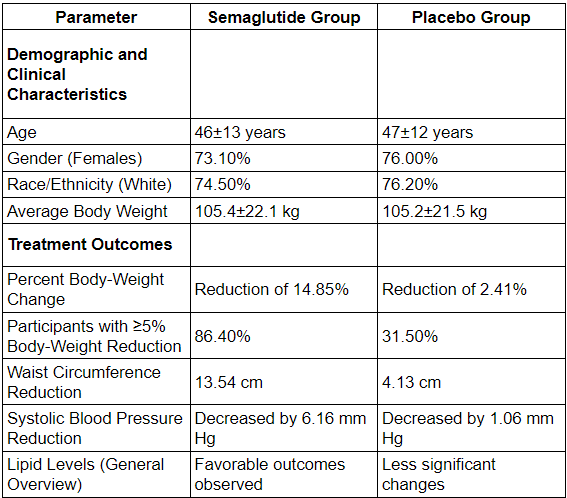Beyond Diabetes: Semaglutide's Role in Weight Management.
Semaglutide's brand names Ozempic (for type 2 diabetes) and Wegovy (for weight loss). This article concentrates on Wegovy and how it combats obesity.
In today's fast-paced world, the battle against obesity has become a paramount concern for many. This chronic condition, often viewed through a lens of societal judgment, is much more than a cosmetic issue. It's a complex health challenge with roots in biology, behavior, environment, and even genetics. As we delve deeper into the world of obesity and its implications, it's essential to arm ourselves with knowledge, understanding, and compassion.
Understanding Obesity: More Than Meets the Eye
Obesity isn't just about carrying extra weight. It's a multifaceted health challenge that has ripple effects throughout the body. Linked to insulin resistance, hypertension, and dyslipidemia, obesity can be the precursor to a host of other health issues. From type 2 diabetes, cardiovascular disease, nonalcoholic fatty liver disease, to more recent findings linking it to severe outcomes in COVID-19 patients, the implications of obesity are vast and varied.
But what causes obesity? Is it just about eating too much and moving too little? While diet and physical activity play crucial roles, the story is more intricate. Factors like genetics, metabolism, hormones, the type of bacteria in the gut, and even the night's quality sleep can influence weight. Moreover, societal structures, including access to healthy foods and safe spaces for physical activity, can impact an individual's weight.
The Journey of Weight Management
Given the complexity of obesity, managing it requires a multi-pronged approach. Lifestyle interventions, such as a balanced diet and regular exercise, remain foundational. However, anyone who has tried to lose weight knows that maintaining weight loss over the long term is where the real challenge lies. It's not just about willpower; it's about sustainable strategies and, sometimes, medical interventions.
This is where drugs like Semaglutide come into the picture. Originally developed for type 2 diabetes management, Semaglutide has shown promise in helping individuals shed pounds. The Semaglutide Treatment Effect in People with Obesity (STEP) program sought to evaluate this drug's efficacy and safety in those with obesity. Over a 68-week trial, the results were promising, offering a beacon of hope for many.
Semaglutide and Its Potential
But what makes Semaglutide stand out? This drug is a glucagon-like peptide-1 (GLP-1) analogue. In simpler terms, it mimics a hormone in the gut, leading to reduced hunger. When combined with lifestyle interventions, it can be a game-changer for some individuals. However, it's not a magic bullet. Like all medications, it's essential to consider potential side effects and consult with healthcare professionals to determine if it's the right choice.
Below is a summary of the statistical data in the research article, Once-Weekly Semaglutide in Adults with Overweight or Obesity by John PH Wilding, which provides a comprehensive overview of the demographics, clinical characteristics, and outcomes of a study involving Semaglutide in adults with overweight or obesity. Here's an analysis of the key statistical data:
Demographic and Clinical Characteristics
The study included two groups: Semaglutide (N = 1306) and Placebo (N = 655). N stands for the number of subjects in the treatment arm. The demographic and clinical characteristics were as follows:
Interpretation and Implications
The statistical data provides robust evidence of Semaglutide's efficacy in inducing weight loss and improving related health parameters. The demographic and clinical characteristics show a diverse and representative sample, adding to the study's validity.
The significant differences between the Semaglutide and Placebo groups in terms of weight loss, waist circumference reduction, and improvement in blood pressure and lipid levels highlight the potential of Semaglutide as a therapeutic intervention for obesity.
However, it's essential to consider the study's context, limitations, and potential biases. The data should be interpreted in conjunction with other research and clinical guidelines to form a comprehensive understanding of Semaglutide's role in obesity management.
The statistical data in the article offers valuable insights into the potential of Semaglutide as a treatment for overweight and obesity. It contributes to the growing body of evidence supporting a multi-pronged approach to weight management, combining lifestyle interventions with pharmacotherapies.
The Broader Picture: A Holistic Approach to Health
While drugs like Semaglutide offer hope, it's crucial to remember that weight management is a holistic journey. It's not just about the number on the scale but about overall health. Mental well-being, emotional health, and quality of life are all intertwined with physical health. As we navigate the world of weight management, it's essential to approach it with a comprehensive mindset.
Moreover, society plays a role. From creating environments that promote healthy living to fostering a culture of understanding and support, collective action is crucial. After all, weight bias and discrimination can have detrimental effects on mental health, leading to a vicious cycle that can exacerbate weight issues.
In Conclusion: The Path Forward
The journey to a healthier weight is indeed a marathon, not a sprint. It requires patience, persistence, and a plethora of resources. With advancements in medical science, like Semaglutide, and a growing understanding of obesity's complexities, there's hope on the horizon.
However, it's not just about medical interventions. It's about creating supportive communities, fostering understanding, and equipping individuals with the tools they need to succeed. By combining science, strategy, and compassion, we can pave the way for a healthier, more inclusive future.





